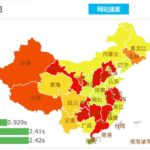Here is a post on website visibility / accessibility in China that could benefit people who want to run a website in China. .CN Chinese Domain Registration If you want to register a China Country code top level domain (ccTLD), .CN for Chinese market, it requires the following documents:
China Internet Censorship
News and insights of internet censorship in China.
China Internet Censorship Overview
Internet censorship in China is conducted under a wide variety of laws and regulations and more than sixty Internet regulations have been made by the corresponding government agencies of China, which have been implemented by state-owned ISPs, companies, and organizations.
China's Internet control is considered very extensive and more advanced than many countries in the world. In China, some websites can not be accessed; individuals are also monitored. Find out what you should do for your website accessibility in China here.
Restricted Content under China Internet Censorship
No unit or individual may use the Internet to create, replicate, retrieve, or transmit the following kinds of information:
- Inciting to resist or breaking the Constitution or laws or the implementation of administrative regulations;
- Inciting to overthrow the government or the socialist system;
- Inciting division of the country, harming national unification;
- Inciting hatred or discrimination among nationalities or harming the unity of the nationalities;
- Making falsehoods or distorting the truth, spreading rumors, destroying the order of society;
- Promoting feudal superstitions, sexually suggestive material, gambling, violence, murder;
- Terrorism or inciting others to criminal activity; openly insulting other people or distorting the truth to slander people;
- Injuring the reputation of state organizations;
- Other activities against the Constitution, laws or administrative regulations.
In September 2000, State Council Order No. 292 created the first content restrictions for internet content providers. China-based Web sites cannot link to overseas news Web sites or distribute news from overseas media without separate approval. Only "licensed print publishers" have the authority to deliver news online. Non-licensed Web sites that wish to broadcast news may only publish information already released publicly by other news media.
These sites must obtain approval from state information offices and from the State Council Information Agency. Article 11 of this order mentions that "content providers are responsible for ensuring the legality of any information disseminated through their services". Article 14 gives government officials full access to any kind of sensitive information they wish from providers of internet services according to Wikipedia.
Latest Development
In May 2011, China's State Council Information Office announced transfer of its offices which regulated the Internet to a new subordinate agency, the State Internet Information Office which would be responsible for regulating the Internet in China.
In mid-2013 police across China announced the arrests of hundreds of people accused of spreading false rumors online. Chinese authorities have said the crackdown is directed at abuses such as fraud, fakery, and slander.
How China Internet Censorship Works
The system blocks content by preventing IP addresses from being routed through. It consists of standard firewalls and proxy servers at the Internet gateways. The system also selectively engages in DNS poisoning when particular sites are requested.
The government does not appear to be systematically examining Internet content, as this appears to be technically impractical. Researchers at the University of California, Davis, and at the University of New Mexico said that the censorship system is not a true firewall since banned material is sometimes able to pass through several routers or through the entire system without being blocked. Details for some commonly used technical methods for censoring are IP blocking, DNS filtering and redirection, URL filtering, packet filtering, VPN blocking, TCP connection reset, man-in-the-middle attack.
